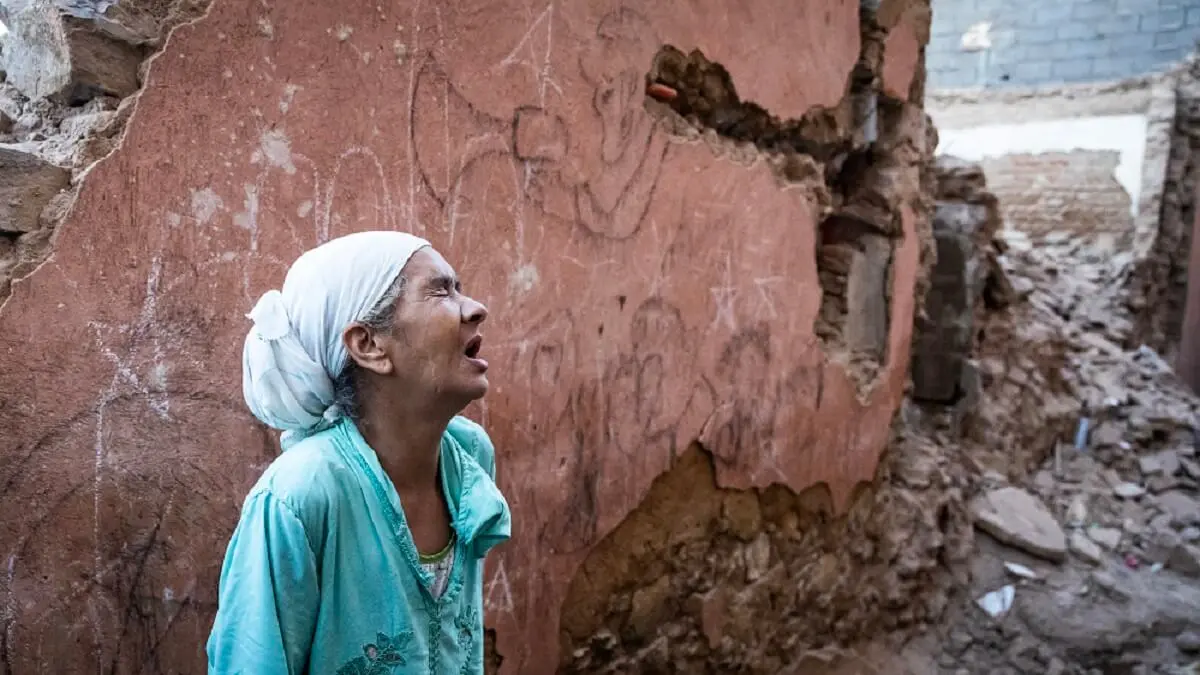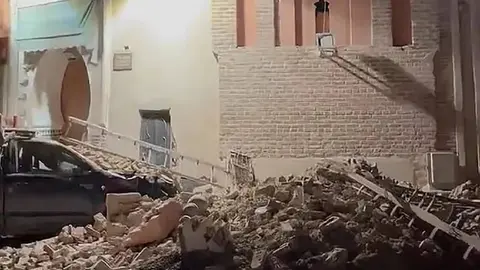Strong earthquake causes tragedy in Morocco

Tragedy struck Morocco in the early hours of Friday morning. A strong earthquake measuring 7 on the Richter scale shook the enclaves of Al-Haouz, Marrakech, Ouarzazate, Azilal, Chichaoua and Taroudant, leaving so far 1,037 dead and more than 1,200 injured, according to the Moroccan Interior Ministry.
Most of the fatalities were recorded in the province of Al-Haouz, with the death toll reaching 542. The province of Taroudant also had around 321 deaths, followed by the province of Chichaoua with 103, the province of Ouarzazate with 38, the prefecture of Marrakech with 13, the province of Azilal with 11, the prefecture of Agadir with 5 and Casablanca with 3 deaths, with one death also recorded in the province of El Youssoufia.
🇲🇦#MARRUECOS 🚨#URGENTE | Más imágenes del momento que se registró el #sismo. #RochexRB27 #earthquake #Terremoto #Temblor #Morocco pic.twitter.com/8l5sstelxP
— Rochex Rababel Robinson Bonilla (@RochexRB27) September 8, 2023
Of the more than 1,200 injured, more than 720 are in a very serious condition, according to ministerial information, which also alluded to the collapse or collapse of a large number of buildings as a result of this strong seismic movement.

The Royal Armed Forces, various Moroccan authorities and national and local health teams have been mobilised to assist where necessary and to continue rescuing and assisting victims, while damage is still being quantified.
🔴🇲🇦|👉 #Terremoto en #Marruecos esta noche de magnitud de 6.8. No hay datos de fallecidos, pero se espera que la destrucción sea grande
— Jacobo Ramos (@JacoboRamosGr) September 9, 2023
Se ha sentido también en #España, #Portugal y #Argelia #Earthquake #Marrakech #Chichaoua #África pic.twitter.com/EN2sGPIV06
The Rabat-based National Centre for Scientific and Technical Research (CNRST) reported that the quake had a magnitude of 7 on the Richter scale and that its epicentre was located in the province of Al-Haouz, southwest of the tourist city of Marrakech. Major tremors were also felt in Rabat and Essaouira, as well as in the areas of Al-Haouz, Taroudant, Chichaoua, Ouarzazate, Azilal, Agadir, Casablanca and El Youssoufia, which bore the brunt with a significant number of deaths.
"According to a provisional balance sheet, this earthquake caused the deaths of 1,037 people in the provinces and municipalities of Al-Haouz, Marrakech, Ouarzazate, Azilal, Chichaoua and Taroudant," the Interior Ministry said in an official statement. According to the same source, more than 1,200 people were injured and hospitalised.
🇲🇦#MARRUECOS 🚨#URGENTE | Sube a 296 los fallecidos tras el #terremoto. Este balance corresponde a las provincias y prefecturas de Al Haouz, Marrakech, Ouarzazate, Azilal, Chichaoua y Tarouda. #RochexRB27 #earthquake #Sismo #Temblor #Morocco #المغرب #زلزال_المغرب #زلزال pic.twitter.com/04Rr6nqb4Q
— Rochex Rababel Robinson Bonilla (@RochexRB27) September 9, 2023
The Moroccan media have indicated that this earthquake is the strongest that the North African country has ever suffered in its history. This extremely serious situation has led the authorities to mobilise all the necessary means at their disposal to help and assist the victims, as indicated by the Ministry of the Interior.
The images and testimonies offered through social networks and the declarations of witnesses to various media have shown the significant damage caused by the earthquake, which has affected very important enclaves in the Moroccan kingdom.
Cenando en una terraza en Marrakech hemos sentido lo que han calificado un terremoto 6.8. No pensábamos que eran tan grave hasta que hemos llegado a la zona antigua, donde se han caído gran parte de los edificios. Increíble lo que los fenómenos de la naturaleza pueden provocar. pic.twitter.com/tpUqWcGwts
— Sonia Marnez (@SoniaMarnez) September 9, 2023
According to witnesses in the Marrakech region, the minaret of the Bab Ailan mosque fell to the ground as a result of the tremor and the entrance to the temple was also damaged. In addition, for example, the earthquake was also felt in the important tourist attraction of Djemaa El Fnaa square, which was filled with people seeking safety from possible aftershocks.
Todo el mundo en las calles por si hay réplicas #Morocco #earthquake #Marrakech #Terremoto #Marruecos pic.twitter.com/YlK7pvyq6r
— Maria Jose Cayuela (@mjcayuela) September 8, 2023
The quake was also felt in several western provinces of neighbouring Algeria, but Algerian civil protection services said there had been no damage or casualties.
Expressions of support and offers of help have begun to reach the Moroccan kingdom from a number of countries, including neighbouring Spain, whose government has officially expressed its condolences for the tragedy.
For the moment, there are no Spaniards among the victims, according to the acting foreign minister, José Manuel Albares. "There are some 18,000 Spaniards living in Morocco. At the moment, we are not aware of any deaths or injuries", he said.
For his part, the president of the PP, Alberto Núñez Feijóo, expressed his "support and solidarity" with Morocco after the earthquake. "After the earthquake in Morocco, all my support and solidarity with our neighbouring country, my condolences to the families of the dead and my wishes for the recovery of the injured," said the leader of the Spanish opposition.









